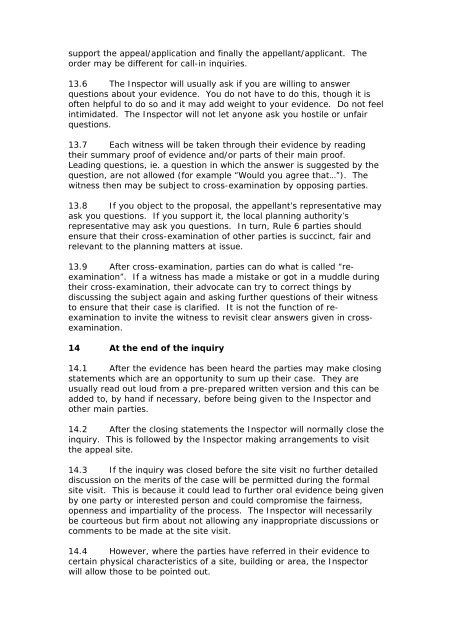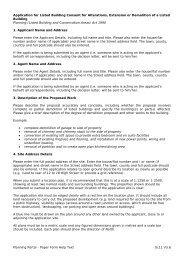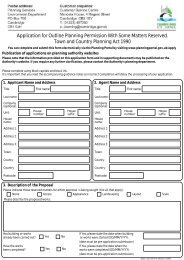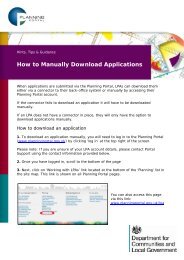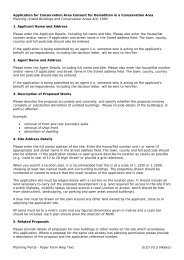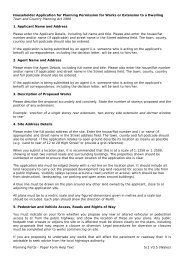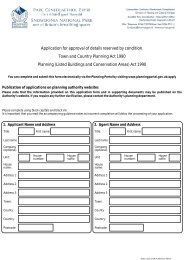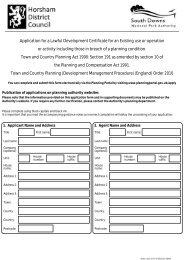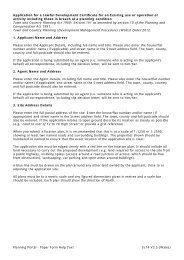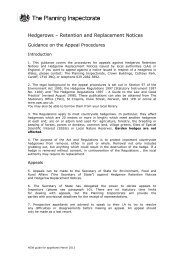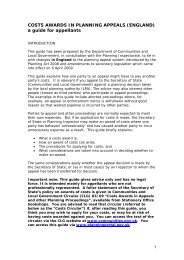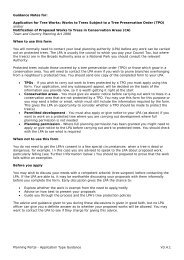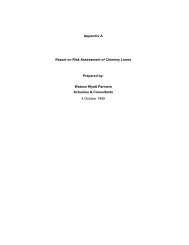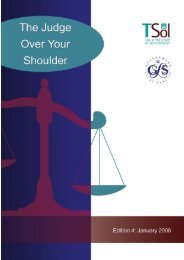Guide to Rule 6 for interested parties involved in ... - Planning Portal
Guide to Rule 6 for interested parties involved in ... - Planning Portal
Guide to Rule 6 for interested parties involved in ... - Planning Portal
Create successful ePaper yourself
Turn your PDF publications into a flip-book with our unique Google optimized e-Paper software.
support the appeal/application and f<strong>in</strong>ally the appellant/applicant. Theorder may be different <strong>for</strong> call-<strong>in</strong> <strong>in</strong>quiries.13.6 The Inspec<strong>to</strong>r will usually ask if you are will<strong>in</strong>g <strong>to</strong> answerquestions about your evidence. You do not have <strong>to</strong> do this, though it isoften helpful <strong>to</strong> do so and it may add weight <strong>to</strong> your evidence. Do not feel<strong>in</strong>timidated. The Inspec<strong>to</strong>r will not let anyone ask you hostile or unfairquestions.13.7 Each witness will be taken through their evidence by read<strong>in</strong>gtheir summary proof of evidence and/or parts of their ma<strong>in</strong> proof.Lead<strong>in</strong>g questions, ie. a question <strong>in</strong> which the answer is suggested by thequestion, are not allowed (<strong>for</strong> example “Would you agree that…”). Thewitness then may be subject <strong>to</strong> cross-exam<strong>in</strong>ation by oppos<strong>in</strong>g <strong>parties</strong>.13.8 If you object <strong>to</strong> the proposal, the appellant’s representative mayask you questions. If you support it, the local plann<strong>in</strong>g authority’srepresentative may ask you questions. In turn, <strong>Rule</strong> 6 <strong>parties</strong> shouldensure that their cross-exam<strong>in</strong>ation of other <strong>parties</strong> is succ<strong>in</strong>ct, fair andrelevant <strong>to</strong> the plann<strong>in</strong>g matters at issue.13.9 After cross-exam<strong>in</strong>ation, <strong>parties</strong> can do what is called “reexam<strong>in</strong>ation”.If a witness has made a mistake or got <strong>in</strong> a muddle dur<strong>in</strong>gtheir cross-exam<strong>in</strong>ation, their advocate can try <strong>to</strong> correct th<strong>in</strong>gs bydiscuss<strong>in</strong>g the subject aga<strong>in</strong> and ask<strong>in</strong>g further questions of their witness<strong>to</strong> ensure that their case is clarified. It is not the function of reexam<strong>in</strong>ation<strong>to</strong> <strong>in</strong>vite the witness <strong>to</strong> revisit clear answers given <strong>in</strong> crossexam<strong>in</strong>ation.14 At the end of the <strong>in</strong>quiry14.1 After the evidence has been heard the <strong>parties</strong> may make clos<strong>in</strong>gstatements which are an opportunity <strong>to</strong> sum up their case. They areusually read out loud from a pre-prepared written version and this can beadded <strong>to</strong>, by hand if necessary, be<strong>for</strong>e be<strong>in</strong>g given <strong>to</strong> the Inspec<strong>to</strong>r andother ma<strong>in</strong> <strong>parties</strong>.14.2 After the clos<strong>in</strong>g statements the Inspec<strong>to</strong>r will normally close the<strong>in</strong>quiry. This is followed by the Inspec<strong>to</strong>r mak<strong>in</strong>g arrangements <strong>to</strong> visitthe appeal site.14.3 If the <strong>in</strong>quiry was closed be<strong>for</strong>e the site visit no further detaileddiscussion on the merits of the case will be permitted dur<strong>in</strong>g the <strong>for</strong>malsite visit. This is because it could lead <strong>to</strong> further oral evidence be<strong>in</strong>g givenby one party or <strong><strong>in</strong>terested</strong> person and could compromise the fairness,openness and impartiality of the process. The Inspec<strong>to</strong>r will necessarilybe courteous but firm about not allow<strong>in</strong>g any <strong>in</strong>appropriate discussions orcomments <strong>to</strong> be made at the site visit.14.4 However, where the <strong>parties</strong> have referred <strong>in</strong> their evidence <strong>to</strong>certa<strong>in</strong> physical characteristics of a site, build<strong>in</strong>g or area, the Inspec<strong>to</strong>rwill allow those <strong>to</strong> be po<strong>in</strong>ted out.


